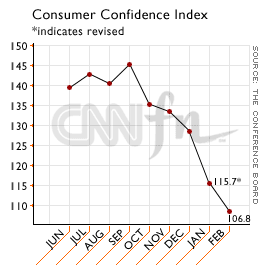|
Confidence tumbles again
|
 |
February 27, 2001: 12:04 p.m. ET
Home sales fall sharply; U.S. orders come in weaker than forecast
|
NEW YORK (CNNfn) - Consumer confidence plunged to a 4-1/2-year low in February, a private research group said Tuesday, while the U.S. government released separate reports showing weakness in housing and industry last month.
The data, while pointing to more weakness ahead for the U.S. economy, gave many investors some cause for optimism. Many analysts hope the latest round of economic reports will persuade the Federal Reserve to slash interest rates again before the central bank's next meeting March 20, a move that would encourage economic growth and boost the ailing stock market.
The Conference Board reported that its index of consumer confidence dropped to 106.8 from January's revised 115.7, as Americans fretted about the job market and other economic conditions. Wall Street forecasts were for a reading of about 111.
| |

|
|
| |
|
|
| |
While the short-term outlook continues to signal a severe economic downturn, consumers' appraisal of current economic conditions suggests we are still undergoing moderate growth and not a recession.
|
|
| |
|
|
| |

|
|
| |
|
|
| |
Lynn Franco
Director
Conference Board's Consumer Research Center |
|
Consumer confidence has not been this low since June 1996, when the index measured 100.1. Americans' confidence is watched closely by policy makers since consumer purchases fuel about two-thirds of the nation's economy.
"The erosion in consumer confidence continues to be fueled by weakening expectations regarding business and employment conditions," said Lynn Franco, director of the Conference Board's Consumer Research Center. "While the short-term outlook continues to signal a severe economic downturn, consumers' appraisal of current economic conditions suggests we are still undergoing moderate growth and not a recession."
The survey found that the percentage of consumers expecting a pickup in business conditions fell to 11.1 percent, from 13.1 percent in January. Only 10.2 percent of consumers anticipated more jobs to become available, down from 11.7 percent in the prior month. Only 22.1 percent expect their incomes to rise, down from 24.1 percent in January.
 The New York-based Conference Board's index is based on a survey of 5,000 U.S. households. The New York-based Conference Board's index is based on a survey of 5,000 U.S. households.
Investors bought up stocks Monday in anticipation that a weak consumer confidence report might encourage the Fed to lower rates again as early as this week. Economists at Bear Stearns helped fuel the speculation, predicting that there is an 80 percent chance the Fed will cut rates in a surprise move by the end of the week.
Bear Stearns senior economist John Ryding said that the latest data "really leaves us on track with our call that the Fed will cut interest rates this week," he said. "I don't see anything here that supports the earlier optimism by the chairman that January somehow marked some sort of improvement in the economy."
Earlier this month, Fed Chairman Alan Greenspan signaled in testimony to Congress that U.S. economic growth has slowed substantially but that there are some hopeful signs that the country will emerge quickly from the downturn. Greenspan is scheduled to deliver additional Congressional testimony on Wednesday.
Stocks traded mixed at midday Tuesday. The Dow Jones industrial average rose about 50 points to 10,693, following Monday's 200-point gain and an earlier decline Tuesday morning into negative territory. But the Nasdaq composite lost about 25 points to 2,284. The bond market rallied.
Home sales slide
Separately, the government said sales of new homes in the United States registered their sharpest monthly decline in seven years last month, in a report that suggests that the overall economic slowdown may be catching up with the housing market.
The number of new, single-family homes sold in January slipped 10.9 percent to an annual rate of 921,000, the government reported. That's down from a record 1.034 million annual rate in December. The latest figure was roughly in line with analysts' forecasts.
It was the largest monthly decline since a 23.8 percent drop in January 1994.
Durable goods orders drop
Earlier Tuesday, the government reported that U.S. orders for long-lasting goods fell 6 percent in January to their lowest level in a year and a half, reflecting a big drop in demand for commercial aircraft and aviation parts.
Orders for all types of durable goods -- big-ticket items such as cars, refrigerators and airplanes -- fell to $202.02 billion last month, the lowest level since $197.10 billion in June 1999, the Commerce Department said.
The plunge was much weaker than the 2.5 percent decline anticipated by economists.
In December, durable goods orders rose a revised 1.2 percent. The gain initially was reported at 2.1 percent.
Orders for transportation products, specifically in the aviation sector, accounted for most of January's decline, sliding 22.4 percent to $43.15 billion after gaining 12.2 percent a month earlier.
Excluding the volatile transportation equipment sector, orders slipped a modest 0.3 percent after falling 2.1 percent in December, the government said. 
-- from staff and wire reports
|
|
|
|
|
 |

|

